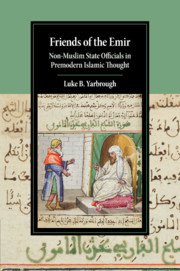Friends of the Emir Non-Muslim State Officials in Premodern Islamic Thought Cambridge Studies in Islamic Civilization Series
Langue : Anglais
Auteur : Yarbrough Luke B.

Reveals how early Muslims devised and elaborated normative views concerning non-Muslim state officials at moments of intense competition.
The caliphs and sultans who once ruled the Muslim world were often assisted by powerful Jewish, Christian, Zoroastrian, and other non-Muslim state officials, whose employment occasioned energetic discussions among Muslim scholars and rulers. This book reveals those discussions for the first time in all their diversity, drawing on unexplored medieval sources in the realms of law, history, poetry, entertaining literature, administration, and polemic. It follows the discourse on non-Muslim officials from its beginnings in the Umayyad empire (661?750), through medieval Iraq, Egypt, Syria, and Spain, to its apex in the Mamluk period (1250?1517). Far from being an intrinsic part of Islam, views about non-Muslim state officials were devised, transmitted, and elaborated at moments of intense competition between Muslim and non-Muslim learned elites. At other times, Muslim rulers employed non-Muslims without eliciting opposition. The particular shape of the Islamic discourse on this issue is comparable to analogous discourses in medieval Europe and China.
Part I. Beginnings: 1. An introduction to the prescriptive discourse surrounding non-Muslim state officials; 2. Preludes to the discourse: non-Muslim officials and late ancient antecedents; 3. The beginnings of the discourse to 236/851; 4. The discourse comes of age: the edicts of the caliph al-Mutawakkil; Part II. Elaboration: 5. Juristic aspects of the discourse; 6. Literary aspects of the discourse; Part III. Efflorescence and Comparisons: 7. The discourse at its apogee: the independent counsel works; 8. The discourse in wider perspective: comparisons and conclusions; 9. Afterword: the discourse to the nineteenth century.
Luke B. Yarbrough is Assistant Professor of Near Eastern Languages and Cultures at University of California, Los Angeles. A specialist in early and medieval Islamic history, he previously taught at Saint Louis University, Missouri, and the Sorbonne, and held research fellowships at the University of Pennsylvania and New York University, Abu Dhabi. He is the author of numerous scholarly articles, as well as a recent edition of a medieval Arabic polemic from Egypt, The Sword of Ambition, by Uthman ibn Ibrahim al-Nabulusi (2016). He holds a Ph.D. from Princeton University, New Jersey and has studied and researched widely in the Middle East, notably in Algeria, Egypt, Morocco, and Tunisia.
Date de parution : 09-2020
Ouvrage de 378 p.
15.3x23 cm
Date de parution : 06-2019
Ouvrage de 378 p.
15.7x23.4 cm
Thème de Friends of the Emir :
© 2024 LAVOISIER S.A.S.



